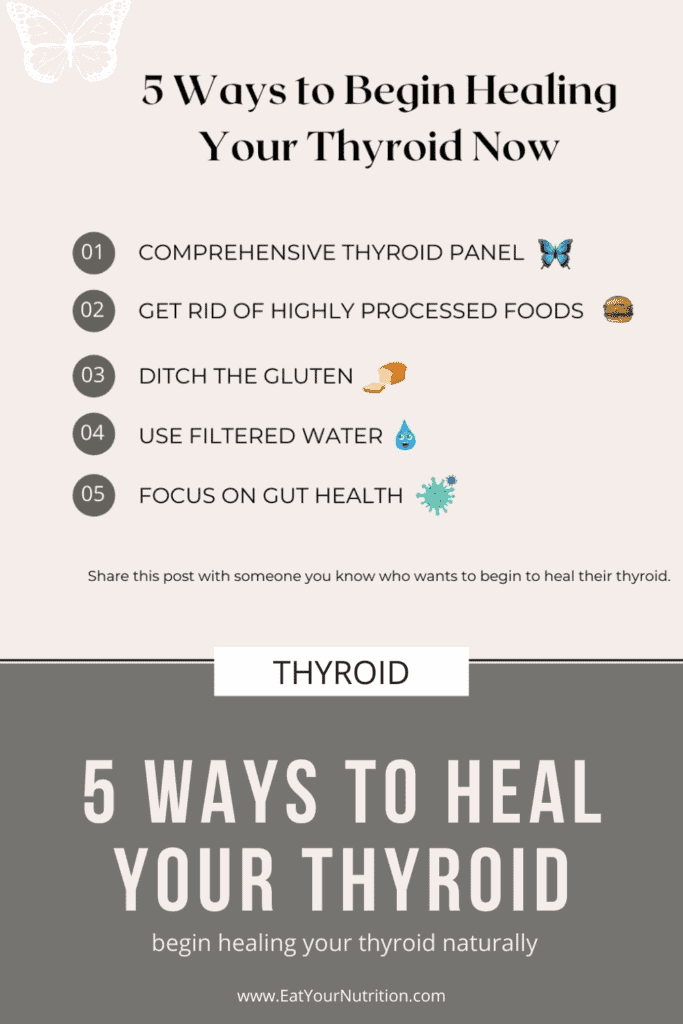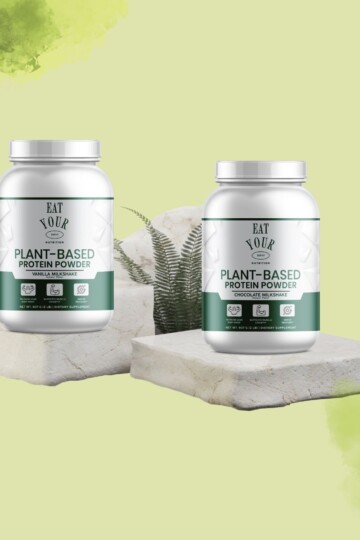Vitamins are essential in maintaining your thyroid health. However, many patients suffering from thyroid disorders are often found to be vitamin deficient, especially in vitamin D. Checking your thyroid levels is critical for thyroid health. Let's discuss vitamin deficiency thyroid health.

Table of Contents
🦋 Thyroid Vitamins And Health
Most people are unaware that vitamin D and your thyroid levels are interrelated.
A few symptoms of thyroid disorders include hair loss, loss of energy, sudden weight gain and difficulty losing it, dry skin, constipation, and increases in cholesterol.
Your thyroid is mainly responsible for producing or discharging hormones that help regulate the rest of your body. Here is a general explanation of how your thyroid levels and hormones work together.
Your body contains a TSH (Thyroid Stimulating Hormone). Your doctor usually measures this when you get a thyroid checkup.
The TSH comes from your brain and goes to your thyroid glands, signaling them to produce T4, also known as your inactive thyroid hormone.
The T4 travels within your tissues and your bloodstream until it gets converted into T3, your active thyroid hormone.
Then T3 gets into your cells to reach your nuclear receptor to increase your metabolism.
💬 Let's Talk Thyroid Vitamins
The vitamins that are found to be most deficient among patients who suffer from any thyroid disorder are vitamins B-12, D, A, B2, and C. The deficiency of vitamin D is found to be one of the most influential in thyroid disorders.
Vitamin D
Vitamin D has anti-inflammatory properties that help increase the flexibility of your immune system.
Therefore, if the levels of vitamin D in your body get seriously low, you may fall prey to autoimmune thyroid disease, also known as AITD.
Vitamin D is also critical in helping insulin resistance, which can adversely affect your thyroid physiology.
Furthermore, vitamin D also plays a huge role in balancing the TH1 cells and the TH2 cells of your immune system by affecting the TH3 cells, which are responsible for the growth of differentiation and expression between your TH1 and TH2 cells. In short, a vitamin D deficiency can be an important problem.
🧡 Other Vitamin Deficiencies
A deficiency in vitamin A limits your body's ability to produce TSH. TSH is essential for converting T4 into T3 and can disrupt your entire metabolic process. It can also lead to poor eyesight.
Deficiencies in vitamins B1, B6, C, and E can lead to an overactive thyroid, which weakens the muscles. Vitamin C is also responsible for keeping your thyroid healthy.
If your body remains deficient in vitamin C for too long, it can cause your thyroid to produce too much hormone. This is the same with vitamin E too.
However, a deficiency in vitamin E can also cause your body to produce less TSH, which.
As mentioned earlier, it disrupts your whole system. If your body lacks vitamin B6, it will not use iodine as its raw material in producing or discharging hormones. Deficiencies in vitamin B2 suppress the functioning of your thyroid, and it fails to produce hormones.
Last but not the least, a weak thyroid cannot absorb vitamin B12. This may result in various neurological problems like neuritis, neuralgia, bursitis, and various mental illnesses.
A deficiency in vitamin B12 can also cause and worsen hypothyroidism. Hypothyroidism is a deficiency in thyroid hormones.
Vitamins are important players in your body's functioning. Find out what your baseline should be. Talk with your doctor about supplements or vitamins to ensure you are getting all the vitamins your body needs to stay healthy! Vitamins are important for your thyroid health.
✅ Five Ways To Begin Healing The Thyroid Now
1. Comprehensive Thyroid Panel
First, begin by having your doctor do a comprehensive thyroid panel, not merely testing the TSH levels.
So, by properly understanding your current thyroid levels, you and your doctor can come up with a plan to balance your hormone levels. You can work in conjunction with a certified holistic nutritionist and doctor to use conventional and non-conventional approaches to healing your body.
📥 GET THIS RECIPE IN YOUR INBOX 📥

2. Get Rid Of Highly Processed Foods
Begin by getting rid of highly processed foods. Focus on eating nutritious foods, including fruits, vegetables, and healthy fats.
Most processed foods are also low in fiber. Increasing your dietary fiber will also benefit your digestive system.
However, too much fiber can worsen hypothyroidism. But, if you still want to maintain a high fiber diet, it's best to speak to your doctor about adjusting your thyroid medication accordingly. Focus on including complex carbohydrates, like sweet potatoes.
3. Ditch The Gluten
Likewise, consider ditching gluten products for naturally gluten-free foods.
Moreover, there is a higher prevalence of the coexistence of thyroid and gut-related diseases, just as Hashimoto's Thyroiditis, Graves' Disease, Celiac Disease, and non-celiac wheat sensitivity(1).
4. Use Filtered Water
Importantly, I highly suggest using filtered water.
For instance, tap water can contain fluoride, chlorine, bromide, lead, perchlorate, BPA, and nitrates. First of all, perchlorate, a chemical found in rocket fuel, is not something that should be in our drinking water. It can seriously impact your thyroid hormones.
Studies have also shown that fluoride is associated with underactive thyroid levels (2). Chlorine and bromine can deplete the body of iodine.
Moreover, proper iodine levels are one of the keys to thyroid health. BPA has been shown to have an antagonistic effect on the thyroid receptor (3).
5. Focus On Gut Health
Above all, learn how to support your gut health. The thyroid-gut connection is real. The thyroid gland can have a significant impact on your gastrointestinal system.
For example, digestive disturbances can be caused by increased motility and decreased motility, depending on hypothyroidism or hyperthyroidism.
In other words, too much or too little thyroid hormone leads to the body's functions slowing down or speeding up. Increased motility leads to diarrhea, and decreased motility leads to constipation.
Dysbiosis is also common in thyroid disorders (1). Dysbiosis is an imbalance of bacteria in the gut. The goal should be to balance the hormones and gut health.

To improve your health, consider trying out one of my nutrition and wellness programs.
🧡 Balanced Hormones - Clear Radiant Skin Program
So, if you're interested in getting healthy, restoring your body and mind, and boosting your energy, check out my Balanced Hormones Program. In the program, you get a ton of delicious, satisfying recipes, as well as strategies that will help you regain control of your health.
Eat Your Nutrition Online Programs
- Balanced Hormones - Clear Radiant Skin Program
- Reset & Renew Nutrition Program
- Restore Your Gut Health Program]
- A Fresh Start Healthy Weight Loss Program
🗣️ Let's Discuss Vitamin Deficiency Thyroid Health!
I would love to hear what your experience has been with your thyroid health. Have you noticed any improvement when you focused on increasing foods rich in vitamins for thyroid support? Let me know in the comments below.
You can also connect with me @EatYourNutrition on Instagram. I love seeing your photos. #EatYourNutrition #LauraVillanueva
📚 References
1. Knezevic J, Starchl C, Tmava Berisha A, Amrein K. Thyroid-Gut-Axis: How Does the Microbiota Influence Thyroid Function?. Nutrients. 2020;12(6):1769. Published 2020 Jun 12. doi:10.3390/nu12061769
2. Kheradpisheh Z, Mirzaei M, Mahvi AH, et al. Impact of Drinking Water Fluoride on Human Thyroid Hormones: A Case- Control Study. Sci Rep. 2018;8(1):2674. Published 2018 Feb 8. doi:10.1038/s41598-018-20696-4
3. Sokal A, Jarmakiewicz-Czaja S, Tabarkiewicz J, Filip R. Dietary Intake of Endocrine Disrupting Substances Presents in Environment and Their Impact on Thyroid Function. Nutrients. 2021;13(3):867. Published 2021 Mar 6. doi:10.3390/nu13030867


















Comments
No Comments